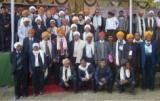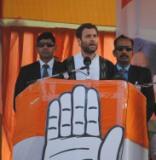Archives
KHASI DEMOCRACY
The tribal governing bodies which the Prime Minister talked about should refer mainly to the Khasi states. Twenty-five of these states signed the Instrument of Accession to the Indian Union, during the country’s independence period, 1947-48, along with the annexed agreement. Most of these states enjoyed a semi-independent status, in which Prime Minister Pandit Jawaharlal Nehru, remarked that “by their stamina, virility and competence, still maintained their freedom, based on ancient ways and tenets of the race. They are an extremely disciplined people, often more democratic than most in India. Without a Constitution, they function democratically and carry out their decisions made by their elders and representatives, almost without exception.
 Today the Panchayati Raj is not applicable in Meghalaya, because of the existence of the Khasi states and other traditional administrative institutions. Yet the Constituent Assembly did not create a separate provision on the status ad powers of the Khasi states, during the framing of the Constitution of India. It is because of sheer deep rooted and integrated in freedom and democracy that the Khasi states continue to function, in the midst of modern democracy.
Today the Panchayati Raj is not applicable in Meghalaya, because of the existence of the Khasi states and other traditional administrative institutions. Yet the Constituent Assembly did not create a separate provision on the status ad powers of the Khasi states, during the framing of the Constitution of India. It is because of sheer deep rooted and integrated in freedom and democracy that the Khasi states continue to function, in the midst of modern democracy.
The Khasi states and other traditional institutions which have been side-tracked and neglected, have decided to assert their rights, privileges and responsibilities, with the formation of the “Grand Council of Chiefs of Meghalaya”, also including the Khasi states, Elaka Doloi and Sirdar, known as the Council or “Dorbar Ki Khlieh Nongsynshar Ka Ri Hynniewtrep”.
Under this umbrella, four public sittings were held, to highlight the role and function of the traditional administrative institutions in the present administrative and political scenario. The last assembly of the Grand Council of Chiefs was held at Mairang in the state of Hima Nongkhlaw, the territory of King Syiem Tirot Singh, who led four year long was against the British forces during 1829-1833 and passed away in captivity in Dhaka, on July 17, in the year 1835. His last words were “better die a free commoner than live the life of a slave king”.
| “The government stands committed to accelerate the pace of development through grass roots democracy, in consonance with the letter and spirit of the Constitutional provisions in this regard.” - A. P. J. Kalam |
The Grand Council attended by the heads of traditional institutions, recalled that the then Prime Minister Rajiv Gandhi, while introducing the Panchayati Raj bill in the Lok Sbha on May 15, 1989,had exempted Meghalaya from the Act, stating that “the bill recognize the three states of North East, Nagaland, Mizoram and Meghalaya, because of the xistence of traditional institutions of self governments, akin to Panchayati Raj, which must be preserved … In these states the traditional systems will be left undisturbed. It is therefore a freak of Constitutional history that the Instrument of Accession, which was accepted by the Governor General of India, C. Rajagopala chari on August 17, 1948, did not find a place in the Constitution.
Muhammed Saludah, member of the Constituent Assembly, during the third reading of the Draft Constitution of India had remarked as follows:- “Sir the Khasi Hills have been relegated to the Sixth Schedule, but there is a Constitutional anomaly. I may sound a note of warning, that this small district of Khasi Hills embraced 25 native states, most of them having treaty rights with the suzerain power in Delhi. They were asked to join the Indian Dominion in 1947.”
The Grand Council of Chiefs in its fourth meeting on February 13, 2013, had urged the Union Ministry of Tribal Affairs to incorporate necessary provisions in Article 13 of the Constitution of India, in the spirit of the Instrument of Accession, in matters of grass root administration. The National Commission for Scheduled Tribes was also urged to look after the matter.
 The Chairman and spokesperson of the Grand Council of Chiefs, John. F. Kharshiing, had expressed his gratitude to the Union Government, that after 65 years since the enactment of the Constitution of India, the government is paying heed to the Consitutional demands, in protecting the rights and traditional customs and administration.
The Chairman and spokesperson of the Grand Council of Chiefs, John. F. Kharshiing, had expressed his gratitude to the Union Government, that after 65 years since the enactment of the Constitution of India, the government is paying heed to the Consitutional demands, in protecting the rights and traditional customs and administration.
Rahul Gandhi, addressing election rallies in the Khasi Hills at Nongpoh and Mawkyrwat, had posed the question of “What is democracy?”. “Democracy is the voice of the people. It is the voice of every person regardless of who he is- whether he is rich or poor. And this is what you have taught to the rest of the country.”
Rahul further said- “I want to thank you for giving this gift to the country, and we for the last couple of years having been running a government in the country, which also tries to listen to the voice of the people before taking decisions.”
| “What is democracy?”. “Democracy is the voice of the people. It is the voice of every person regardless of who he is- whether he is rich or poor. And this is what you have taught to the rest of the country.” - Rahul Gandhi |
Praising the unique grass root democracy practiced by the indigenous people of Meghalaya, which gives the common man’s voice be heard, he said- “the West talks about democracy and over here you have traditional democracy for hundreds and hundreds of years.”
In a similar tone former Prsident of India, A.P.J. Kalam, while addressing the joint sitting of Parliament, on June 7, 2004, had stated: - “The government stands committed to accelerate the pace of development through grass roots democracy, in consonance with the letter and spirit of the Constitutional provisions in this regard.”
It is evident therefore that the national leadership is now gradually realizing of the growing importance of the traditional grass root democratic system of administration, to further the cause of economic development and uplift the welfare of the people of India.

